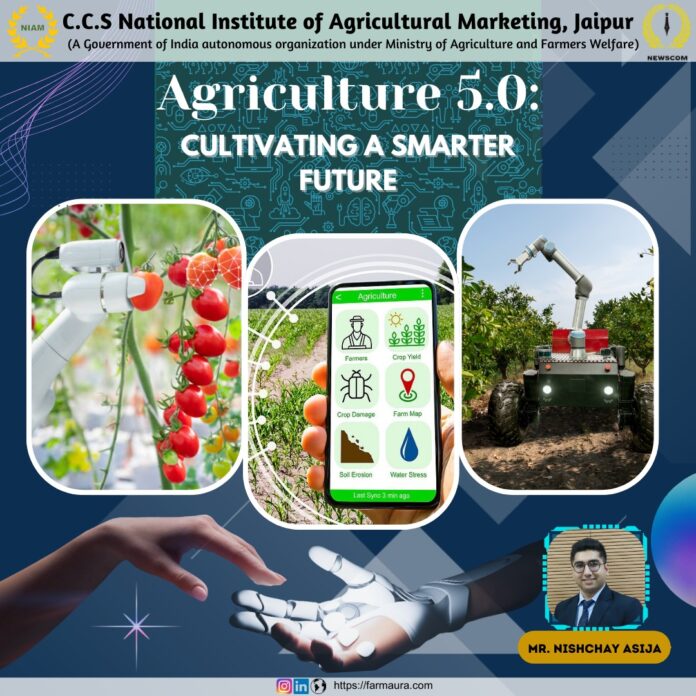Agriculture 5.0 is transforming farming into a high-tech data-driven industry. With Artificial Intelligence (AI), the Internet of Things (IoT) and Machine Learning (ML), Agriculture 5.0 enhances efficiency, sustainability and productivity, ensuring the world’s growing food demands are met without compromising the environment.
Introduction
- Agriculture 5.0 marks a shift from traditional practices to data-intensive, technology-led approaches. AI, IoT and ML are central to this transformation, providing tools for precision farming, predictive analytics and resource management.
- In the United States, for example, John Deere uses AI-driven sensors in tractors to analyse soil conditions and crop health, optimizing planting and harvesting decisions. In India, Gramophone, an agri-tech startup, uses IoT sensors to collect environmental data for farmers, advising on crop cycles and pest control.
Key Technologies
- Artificial Intelligence (AI) AI helps automate decision-making, improve yield predictions and manage risks. For instance, Plantix, an AI-powered mobile app, diagnoses crop diseases and suggests treatments by analysing photographs uploaded by farmers.
- Internet of Things (IoT) IoT networks connect devices across farms, gathering data on soil moisture, crop health and weather. This data aids precision farming by allowing farmers to optimize water use, fertilizer applications and pest control.
- Machine Learning (ML) ML algorithms process large datasets, generating predictive models that guide agricultural strategies. For example, IBM’s Watson Decision Platform uses ML to help farmers make data-driven decisions, predicting weather patterns and crop yields accurately.
Components and Applications
| Technology | Application | Real-World Example |
| AI | Crop Health Monitoring | Plantix app |
| IoT | Precision Farming | Gramophone sensors in India |
| ML | Predictive Analytics | IBM Watson Decision Platform |
Real-Life Case Studies
- Smart Irrigation in Israel
Israel’s Netafim uses IoT-enabled drip irrigation to control water flow based on real-time soil data, optimizing water usage in arid regions. This reduces water consumption by up to 50% compared to traditional methods.
- Robot Harvesters in the Netherlands
Agrobot’s AI-driven robots harvest strawberries based on ripeness levels detected by visual sensors, reducing labor needs and ensuring peak quality. This method has increased production rates by 30% at participating farms.
Advantages
- Resource Efficiency: Reduced water, fertilizer and pesticide usage.
- Increased Yields: Precision farming enhances productivity.
- Risk Management: Predictive analytics mitigate crop failures.
- Environmental Sustainability: Minimizes waste and promotes soil health.
As Agriculture 5.0 grows globally, investments, adoption rates and policy initiatives are rapidly increasing.
The global smart agriculture market, which includes AI, IoT, and ML applications, is projected to reach $29 billion by 2026, growing at a compound annual growth rate (CAGR) of 9.9% from 2021. The Asia-Pacific region, in particular, is experiencing rapid adoption, with investments in AI-driven agri-tech expected to reach $7.6 billion by 2025.
Government Schemes
Governments worldwide are investing in agricultural technology to enhance food security and promote sustainable practices. In India, several schemes support technology-driven agriculture:
- Digital Agriculture Mission (2021-2025): Launched by the Indian government, this mission promotes the integration of AI, IoT and data-driven solutions in agriculture. The mission has a budget allocation of INR 500 crore, aimed at modernizing Indian agriculture through technology.
- Pradhan Mantri Kisan Samman Nidhi (PM-KISAN): While this scheme primarily provides financial support to farmers (INR 6,000 per year to small farmers), it also indirectly encourages investment in advanced farming tools and practices by improving farmers’ financial stability.
- National e-Governance Plan in Agriculture (NeGPA): Focused on strengthening digital infrastructure in agriculture, NeGPA promotes AI, ML and IoT in farming. The plan aims to digitize 500 districts by 2025, with a focus on providing advisory services and crop management insights to farmers.
Government Schemes and Financials
| Aspect | Description | Financials |
| Global Smart Agriculture Market | Expected market size by 2026 | $29 billion |
| Digital Agriculture Mission | Indian government mission supporting AI, IoT and ML in agri | INR 500 crore budget (2021-2025) |
| PM-KISAN Scheme | Financial aid to small farmers | INR 6,000 per year per farmer |
| NeGPA | Digital infrastructure plan for 500 districts in India | Targeted completion by 2025 |
| Agri-Tech Investments in Asia-Pacific | Expected investment in AI-driven agri-tech by 2025 | $7.6 billion |
| Israel’s Drip Irrigation Tech | Water savings in arid farming regions | Up to 50% reduction in water use |
| Agrobot’s Robot Harvesters | Yield increase through AI-based harvesting | 30% higher production rates |
Recent Advances
- Increased Adoption of AI in Asia-Pacific: According to recent reports, AI adoption in agriculture is growing rapidly in Asia-Pacific, with a CAGR of 30.5% from 2022 to 2027.
- U.S. Department of Agriculture’s (USDA) Initiative on IoT and ML: The USDA recently allocated $500 million to fund IoT and ML projects that aim to enhance food security and crop resilience.
- European Union’s Horizon 2020 Program: Allocated €1 billion to agricultural technology innovations, focusing on sustainable farming and precision agriculture.
Conclusion
Agriculture 5.0 is redefining farming through the integration of AI, IoT and ML. As these technologies continue to advance, they promise to make agriculture more sustainable, efficient and resilient to climate challenges, setting the foundation for a food-secure future.
Sources
- Ministry of Agriculture & Farmers Welfare Website
- PM-KISAN Official Portal
- Organisation for Economic Co-operation and Development (OECD) Agriculture Statistics
- United States Department of Agriculture (USDA) Reports




